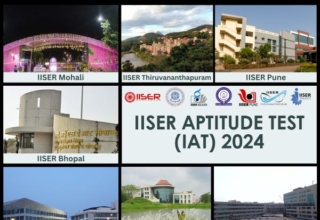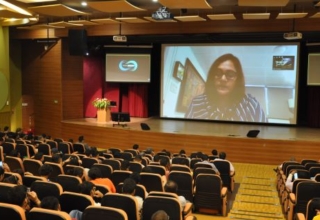
E-content is enjoyable, doesn’t contribute to learning. A sure way of driving children away from screens (devices) is getting them into habit of reading books.
Under Samagra Scheme, integrated scheme of school education that has subsumed SSA, RMSA and Teacher Education this year, schools are given Rs 20, 000 grant to buy books from National Book Trust (NBT) and NCERT. The ambitious scheme launched to make non-academic books available to students from May this year is with the objective of promoting read habits in them.
 The government is also intending to revise the Vidyarthi Computer Scheme with the goal of improving content with illustrations and other guidelines. Speaking at a Children’s Publishing Conclave organized by business chamber of commerce, FICCI in New Delhi on Aug 25, Rina Roy, Secretary Department of School Education & Literacy MHRD outlined the need of reading to children for realizing the power of reading. “It is important to make reading fashionable by way of roping in celebrities and icons because reading is way to learning. Children need to be explored to ideas of greater minds, their foundation need to be laid from the classics. E-content is enjoyable but studies have shown it is not good for education,” she said while making her own love for books known. According to her, her own collection of books is around 8000 books and once she retires from service, her plan is to open a bookshop in Goa. Referring to recently released National Achievement Survey (NAS) report, she said that promoting reading is critical for outcomes and also advocated use of theatre as a medium to get children interested in non-academic books.
The government is also intending to revise the Vidyarthi Computer Scheme with the goal of improving content with illustrations and other guidelines. Speaking at a Children’s Publishing Conclave organized by business chamber of commerce, FICCI in New Delhi on Aug 25, Rina Roy, Secretary Department of School Education & Literacy MHRD outlined the need of reading to children for realizing the power of reading. “It is important to make reading fashionable by way of roping in celebrities and icons because reading is way to learning. Children need to be explored to ideas of greater minds, their foundation need to be laid from the classics. E-content is enjoyable but studies have shown it is not good for education,” she said while making her own love for books known. According to her, her own collection of books is around 8000 books and once she retires from service, her plan is to open a bookshop in Goa. Referring to recently released National Achievement Survey (NAS) report, she said that promoting reading is critical for outcomes and also advocated use of theatre as a medium to get children interested in non-academic books.
The discussion that followed her remarks also raised some very important issues. Well known children’s author, Devika Rangachari, a historian brought about the negative notions that have been surrounded around school libraries and books. She said librarians and libraries in schools are mostly used as a substitute for teachers. Sending students to library is considered as a good punishment. So, with such low importance given to libraries, how can students get hooked to books? “The ritualistic book weeks or book reviews as seen by many schools as the great activity and service to reading habit promotion means nothing. There are better ways to encourage students to read and become readers. You need to engage children, provide books of their interest. This activity must move beyond the domain of English teacher and librarian, every teacher must get involved,” she said.
Books are not passé.
 In November 2016 Bengaluru-based Justbooks was launched as an online library chain with a unique model of renting non-academic books. It is world’s largest commercial library chain, with a presence in 80 centers across Bengaluru, Hyderabad, Pune, Chennai & Mumbai and growing. The company has been built to leverage the core of technologies like IOT/M/c learning to drive efficiency within the organization & superior experience for end consumers with 10,00,000 books. The company has been pioneering omnichannel inventory for enhancing the availability of inventory & auto checkout features in its physical centers. Its subscription model lets users read books at a fraction of cost. According to Suresh Narasimha, cocreator and chairman of the company, over the past one and a half years, we have been able to challenge the notion that children are no longer interested in books. “The young parents find it very appealing and handy when books actually take kids away from smart phones. With renting option, they can provide their children with multiple interest books and children do respond. It is our experience,” he says.
In November 2016 Bengaluru-based Justbooks was launched as an online library chain with a unique model of renting non-academic books. It is world’s largest commercial library chain, with a presence in 80 centers across Bengaluru, Hyderabad, Pune, Chennai & Mumbai and growing. The company has been built to leverage the core of technologies like IOT/M/c learning to drive efficiency within the organization & superior experience for end consumers with 10,00,000 books. The company has been pioneering omnichannel inventory for enhancing the availability of inventory & auto checkout features in its physical centers. Its subscription model lets users read books at a fraction of cost. According to Suresh Narasimha, cocreator and chairman of the company, over the past one and a half years, we have been able to challenge the notion that children are no longer interested in books. “The young parents find it very appealing and handy when books actually take kids away from smart phones. With renting option, they can provide their children with multiple interest books and children do respond. It is our experience,” he says.
In fact Justbooks library model has given a facelift to the perception of public libraries which are in a bad shape. With use of technology, the human interface has been almost done away with and tracking and delivering the book is so fast that consumers are empowered as never before. The ‘profit making’ library has books in ten languages.
Reading books is certainly a better means of imbibing the substance and comprehension. And, if helps in reducing screen spending time, it is definitely healthy and in inculcating values of critical thinking in all age groups.











